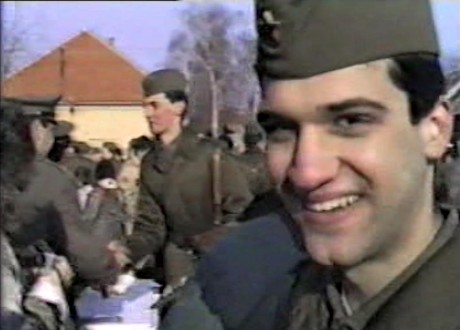


I Pledge

Directed by Nikola Dragovic & Milutin Petrovic. Based primarily on VHS-tapes recorded by Predrag Bata Miloševic with Igor Dikic (Goga) as the protagonist.
A soldier’s story. Could be anywhere, any soldier. A young man’s story. Seen from today, 30 years later. Universal when you think about the film as I did after two screenings. Because even if I have been visiting Serbia once a year during the last 15-16 years, and have heard about/seen films about the end of Yugoslavia and the war and conflicts, there are many details referring to battles and geography that I know too little about. And yet I would argue that this is a universal human story. For you to know before reading this positive review…
Positive because it is well constructed and emotional, because it shows the crazyness of war and what – in this case – a young man of 19 years drafted for the Yugoslav National Army in 1990 had to go through.
The scoop is that his uncle , who presents himself in the film, Predrag Bata Miloševic, is a dedicated cameraman, who filmed Goga when he was drafted for the army. Actually before that very day…
The film starts with footage of the whole family saying goodbye to the young man, what a party, he gets (sorry for my French) pissed and the scenes are full of this strange atmosphere of not knowing what will happen; including worry as does the mother shows so clearly – she is a very important person in the film.
The cameraman, he is called Bata, follows him and the family to the ceremony, where the soldiers give their pledge to the nation and the flag…
30 years later Goga sits in his armchair looking at himself – as does his mother. They comment on what was filmed then AND what was filmed in 1992, again in an interview with Bata, after he had served the army for three years. That’s where the horror stories start. He was in Varazdin in the Republic of Croatia, where the Yugoslav National Army had bases and where they got into battles with the Croats at the time, where the neighbouring country Slovenia close to Varazdin had already declared their independence from Yugoslavia. Goga tells what happened, how he and others got out, how others had surrendered, how he got back to Belgrade, was accused of being a traitor, beaten up and sent back to army duty– and how he suffered, when it was all over and he was back with the family. Nightmares – he stuttered when he came back, says the mother.
In the film Goga goes back to the barracks and to Varazdin and meets with a Bosnian lieutenant who was the only one taking care of the soldiers – «the kids» as Radimir Cacic says in the film (Wikipedia: In the Battle of the Barracks, Cacic led the September 1991 negotiations with the Yugoslav People’s Army to abandon the Varadin barracks).
How do you see the young man (himself) on the tapes 30 years ago? «He is lost», Goga says. And he is not the only one, the only soldier who has gone through horrible times. But not many have an uncle, who has followed along with a camera. It is amazing material put together in a fine way – pacifistic , mingling the story with absurd Yugoslav army propaganda films to stress the absurdity.
Serbia, 2020, 86 mins.